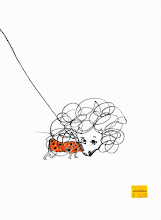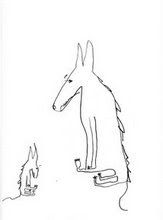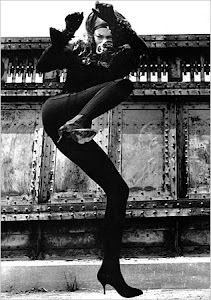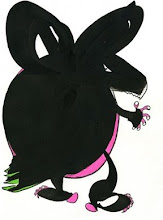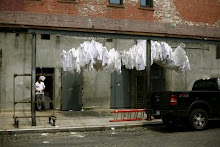Margaret Visser has the kind of voice that a Brit might call "plummy" though it seems to me to be something closer to caramel or dark fudge sauce. In other words, she is someone you want to listen to even if she's merely reading the phone book.
Who is she and how do we know this? At first we thought she was an academic dug up by the diligent producers of the CBC -- she was a regular on Morningside back when it existed; she may still be a regular of the CBC but I am not.
Lucky for us, though, she is also and perhaps foremost an author of remarkable books on tiny subjects, "micro histories" they are now called, now that this has morphed into a full-on genre.
A beloved much earlier book, Much Depends on Dinner, was about dinner --she traced the history and social mores behind the most typical of plain suppers, roast chicken with potatoes, corn -- and how each element came to be on our plate and its place in the world of agriculture, commerce, culture. She spoke of it weekly on the radio, and reading it was even better. Delicious.
Her newest book is The Gift of Thanks, a clever bit of scholarship on the history and meaning of gratitude. Fingers crossed that if there is an audio version, she is the one who is reading aloud. That would be something to be grateful for.
Gratitude is often in short supply.
There is very little that is more alluring, charming, engaging, warm.
Twenty-four hours ago I left the memorial service of a woman I never met but wish I had; a woman who had such a force of personality, whose life force was so strong that I, a total stranger, was touched by her, moved by her example, and I like all of her friends and her family am determined to learn from her so that she did not die in vain.
In short, she was a great many things that can be summed up by the fact she was grateful. She loved life and knew it to be a gift, she lived every moment, she fought for things worth fighting for and laughed at the rest. She could see the funny side, she chose to be thankful for what she had rather than lament what she didn't -- and what she didn't have was profound. She didn't have health and therefore didn't have time, the time to see her kids grow up or to see her garden bloom. No matter.
From the stories her friends and family told of her, from the deep grief they feel, from the photographs that show her bright smiling, always smiling, face it is clear she was remarkable and someone put on earth to show the rest of us how it's done. In particular there were two photos of her with her husband -- one on their wedding day, one where she is leaning her head against his shoulder and what we see is the utter contentment and quiet happiness of loving and being loved, and knowing that love will never be forsaken.
She loved. Loved life, she loved her family, she loved her friends, career, books, music, her garden, her home. She was postive, a light in the darkness, she did not take for granted, not anything, not one thing.
Appreciate more. Be more kind than is necessary, everyone has their own struggle. Show gratitude.
What a good book at the right time.
Monday, September 22, 2008
Monday, September 15, 2008
Reading like a man
There is a stack of books on my bedside table which makes me feel quite manly. I've never known one, a man I mean, who has the stick-to-it-ive-ness to settle on just the one; rather, I've witnessed the casual browse through this book until it gets sloggy, then that one, maybe back to the first, always on a search for whatever it is they search for. Excitment I suppose.
It's enough to make a girl shake in her Laboutins. But let's assume a reading pattern isn't a lifestyle....
When Will There Be Good News is another fantastic story by the fantastic Kate Atkinson. Her first book, Behind the Scenes at the Museum, is on my permanent list of suggestions for anyone jaded by books and in need of a read. The direction her writing has taken was not predictable by this first excellent attempt; she's moved from the initial appearance of literary fiction tending to chick lit to become a sort of mystery writer but of the best kind. There is a story, there are real characters and real pathos, the mystery feels eerie and sad rather than formulaic. And, Atkinson can capture a child on paper like no other. That we did see in Museum.
Lover of Unreason is a biography of a minor character (a personal favorite though you won't find these on the best seller lists), the tragic second wife of Ted Hughes, a man who is either a cad beyond comprehension or the unluckiest bastard on earth. Perhaps we should check the bedside table for clues. You will recall his first wife Sylvia Plath offed herself after giving the children their lunch, sticking her head in the gas oven. At least the children were saved. Not so the child of Ted and Assia Wevill, a tortured (maybe by Ted, maybe not) beauty and a poet in her own right. Assia grew up the cherished and spoilt daughter of a lazy physician and his wife; the family fled Nazi Germany for Israel where daddy was one of a multitude of physicians caring for impoverished and not very sick people without healthcare insurance to mitigate any costs. So, times were a little tough. How she meets Ted and why she ended up with her own pretty head in the oven we don't know yet. As I say, I'm reading like a man, a little here and a little there.
Both books are equally compelling in their own way you see.
Maybe that's a larger metaphor than I think......and an answer to the mystery of Mars.
It's enough to make a girl shake in her Laboutins. But let's assume a reading pattern isn't a lifestyle....
When Will There Be Good News is another fantastic story by the fantastic Kate Atkinson. Her first book, Behind the Scenes at the Museum, is on my permanent list of suggestions for anyone jaded by books and in need of a read. The direction her writing has taken was not predictable by this first excellent attempt; she's moved from the initial appearance of literary fiction tending to chick lit to become a sort of mystery writer but of the best kind. There is a story, there are real characters and real pathos, the mystery feels eerie and sad rather than formulaic. And, Atkinson can capture a child on paper like no other. That we did see in Museum.
Lover of Unreason is a biography of a minor character (a personal favorite though you won't find these on the best seller lists), the tragic second wife of Ted Hughes, a man who is either a cad beyond comprehension or the unluckiest bastard on earth. Perhaps we should check the bedside table for clues. You will recall his first wife Sylvia Plath offed herself after giving the children their lunch, sticking her head in the gas oven. At least the children were saved. Not so the child of Ted and Assia Wevill, a tortured (maybe by Ted, maybe not) beauty and a poet in her own right. Assia grew up the cherished and spoilt daughter of a lazy physician and his wife; the family fled Nazi Germany for Israel where daddy was one of a multitude of physicians caring for impoverished and not very sick people without healthcare insurance to mitigate any costs. So, times were a little tough. How she meets Ted and why she ended up with her own pretty head in the oven we don't know yet. As I say, I'm reading like a man, a little here and a little there.
Both books are equally compelling in their own way you see.
Maybe that's a larger metaphor than I think......and an answer to the mystery of Mars.
Subscribe to:
Posts (Atom)
